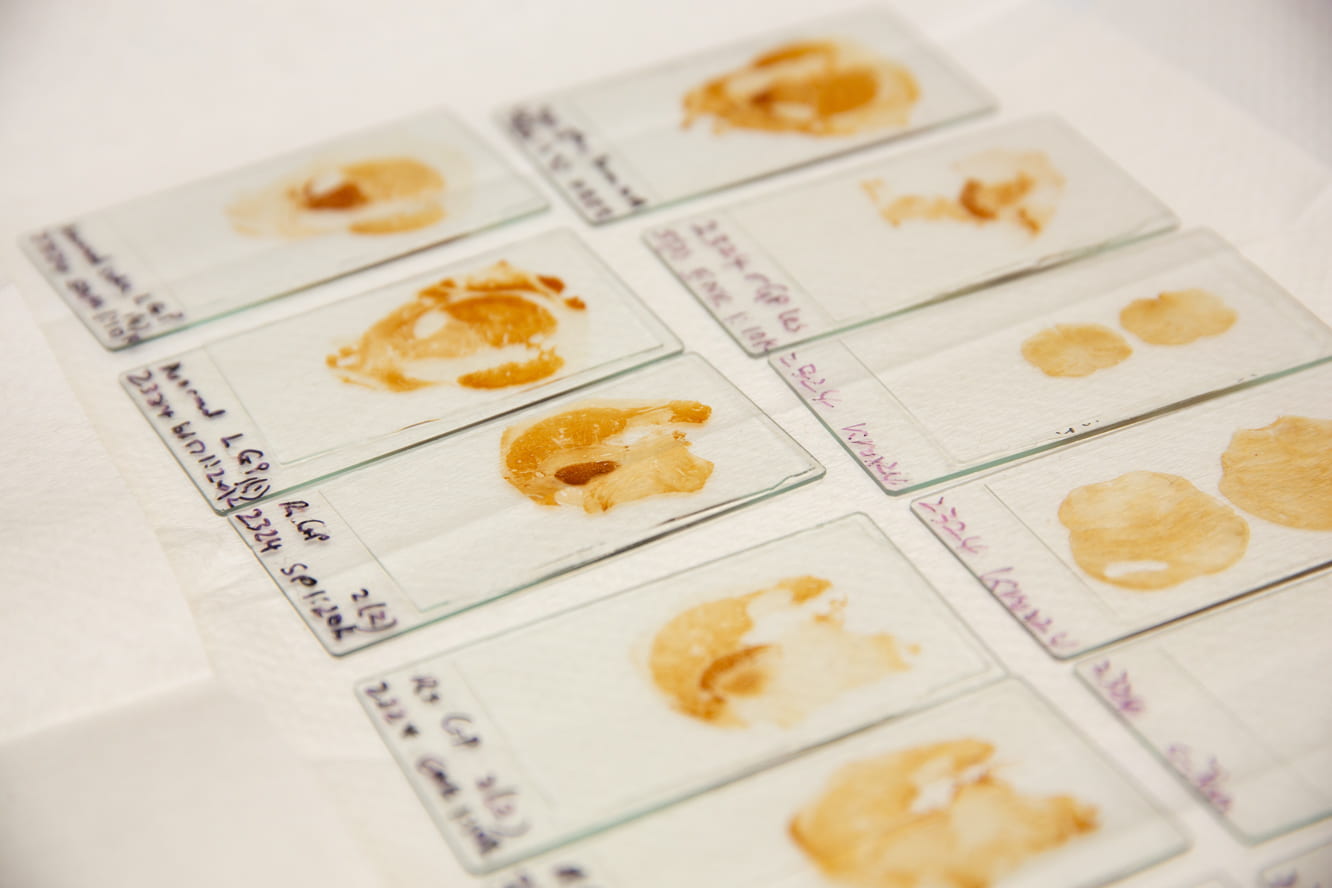The Process
The Brain Donation Registration Process
If you are interested in being a brain donor there is a special donor information pack available for suitable donor candidates detailing the necessary procedures of bequeathing tissue to the Brain Bank. However in the first instance please fill out the following information and a member of the Brain Bank team will be in contact with you. You can change your decision about brain donation at any time. Simply write us and indicate you wish to withdraw consent.
Get in Touch
If you are interested in being a brain donor please fill in the form below to start the brain donation registration process. We will then be in touch.
Donor Information Pack
Our brain bank team will send out a donation pack to suitable candidates and may discuss with you more specific medical information, if required.
Discuss with Family
Discuss your wish to donate your brain to science with your family.
Register for Brain Donation
Fill in the donation forms that we send you and return them to us so that we have your offer of brain donation on record.
Contact us When a Donor has Died
The removal of your brain must happen within 24 hours after you die, so your family will need to contact us soon after your death.

All of our procedures have been developed for the timely acquisition of postmortem normal and diseased human brains and our processes have approval from the relevant ethics committees. We work with the mortuary closest to where a donor has died in New Zealand where the brain can be removed. We work with the local mortuary to ensure the right brain processing approaches are used.
The collection procedures are very efficient, with a shorter postmortem delay than is possible at most of overseas brain banks. As a result, requests for human brain tissue have been received from overseas research laboratories and research groups have established very productive and mutually beneficial research collaborations with leading brain research groups in New Zealand, Europe, Scandinavia, Japan, USA and more.
There are both ethical and legal procedures relating to the acquisition of postmortem brains, which are strictly followed. Patients and family members usually decide to donate their brain before death (often years), so when the time comes the bequest process is both sensitive and efficient.
It is scientifically important that the tissue is collected as soon after death as possible, ideally within 2-24 hours and all human brain tissue is carefully documented and stored to form a comprehensive human Brain Bank for the study of neurological disorders and brain diseases in New Zealand and overseas. “This is extremely sensitive and skilled work,” says Sir Richard. “We’re developing tikanga Māori practices so Māori researchers feel comfortable researching the human brain.
A special donor information pack is available for suitable potential donors and families, detailing the necessary procedures of bequeathing tissue to the Brain Bank.
The normal human tissue is taken from subjects who had previously been in good health with no known history of neurological disease or drug treatment and who had died suddenly without receiving medication (e.g., road traffic accidents, sudden fatal myocardial infarction etc.).
All Auckland human tissue bequests are routinely tested to exclude potentially hazardous infectious diseases (e.g., HIV, Hep B, Creutzfeldt-Jakob Disease etc).
Processing, analysis and storage of the brain
On receipt of the brain, tissue is processed for pathological studies and for research studies. The research studies that will be performed on the donated brain tissue include: anatomical studies to understand the brain structure; pathological studies to understand any disease process that might have affected the brain; cell culturing to enable drug testing of new and existing potential drugs to be tested on human brain cells; molecular biology techniques that enable proteins, DNA and RNA to be studied; genetic studies allow the detection of genetic abnormalities or gene combinations to be understood that may contribute to a neurological condition. The genetic studies may include the manipulation of genes in cell culture to overexpress or knockout genes of interest to neurological diseases. The studies required to achieve a diagnosis (even to confirm that the brain is unaffected by a disease) may take up to a year. At the conclusion of these studies, the results will be discussed with the next of kin and then a letter containing the pathology report findings will be sent to you. After the pathology studies are complete, the brain tissue can be used for research purposes. Specific information about research findings from that case will not usually be shared with the next of kin. The only conditions under which we would consider varying this is if the genetic information indicated a high risk of the rapid emergence of a serious medical condition in other family members. In this case, we would discuss the implications with a clinician who holds relevant expertise, and then if indicated discuss with the consenting family member.
Brain Donation Form
If you are interested in being a brain donor please fill out this form and submit it for more information.
Contact Us
For emergencies call 111 or visit your nearest hospital
For general inquiries:
+64 9 923 6072 – Mrs Marika Eszes, Brain Bank Manager
At time of death:
+64 21 287 8476 – Professor Maurice Curtis, Co-Director
